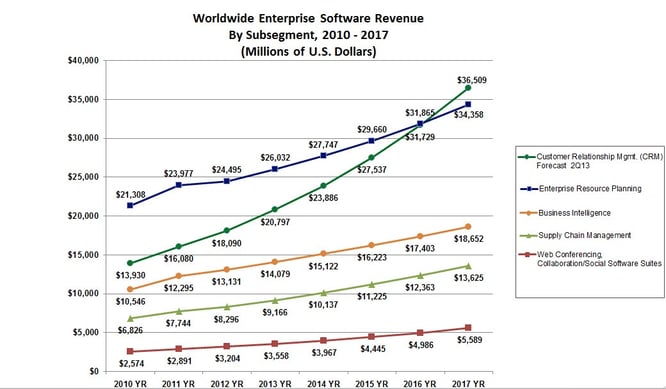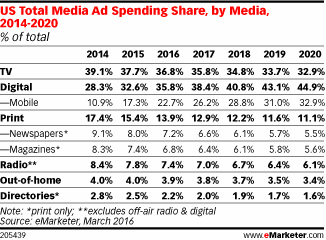In the last fifteen years, digital marketing budgets have gone from table scraps to approaching the lion’s share. This is due, in large part, to shifts in consumer attention and innovations in digital technology.
As 2017 approaches and budget planning begins, companies need to determine how their digital investments will evolve. This will come in the form of both media spend and internal process.
Marketers Are Adopting CRMs To Gain An Edge

Investments in CRMs, or Customer Relationship Management software, is expected to grow considerably in 2017. While digital CRMs have been around for more than two decades, new web-based CRM solutions have led to wider adoption and appeal among smaller businesses.
What Are CRMs?
A CRM “refers to practices, strategies and technologies that companies use to manage and analyze customer interactions and data throughout the customer lifecycle, with the goal of improving business relationships with customers, assisting in customer retention and driving sales growth.”
In simpler terms, a CRM is a database containing your leads and customers, designed to manage the sales, retention, and communication process.
Investments in CRMs Are Increasing Significantly
An enterprise software forecast from Gartner shows a 15% increase in CRM investments in 2017 compared to 2016. This would mark the second consecutive year of 15% growth in this technology. Even more impressive, CRM investments are expected to become the single largest enterprise software channel in 2017, surpassing ERP (enterprise resource planning). Furthermore, investments in CRM are expected to nearly equal business intelligence, supply chain management, and web conferencing/social software suites COMBINED.

Why Marketers Should Care About CRMs
As marketing and sales teams become further integrated, CRMs are becoming a more critical resource. Once focused solely on database management, CRM technologies are now expanding into the world of website content management and digital marketing tools. Some of today’s CRMs are even capable of powering website contact forms, email marketing, blogs, and social media management.
Instead of just managing the leads and contacts generated by marketing, CRMs are now powering the technology that generates the leads in the first place. This end-to-end view empowers CMOs and sales managers to see all the way through the customer lifecycle.
Digital Media Investments To Reach #1 in 2017
According to a recent report from eMarketer, more money will be invested in digital than any other channel in 2017. This marks the first time digital has surpassed traditional offline channels in terms of total media spend.

Even more impressive is the rise of mobile media investments. By 2020, investments in mobile (a mere subset of digital) will be equal to television. By this time, total investments in digital will exceed television by roughly 36%.
This trend has several implications for how businesses go about investing media spend.
Increased Options
The more businesses are willing to invest in digital channels, the more ways they’ll have to do it. This includes more tools, more technologies, and more agencies vying for the business. Avoid getting caught up in tools, and instead, stay focused on the business outcome you’re trying to create from your marketing activity.
New Opportunities In Old Places
As more people flock to one place, it creates new opportunities in another. For example, an exodus from direct mail marketing may lead to improved direct mail performance for some businesses. As your competitors leave a particular channel, it becomes easier to stand out. It may also reduce the cost to invest in the channel. Reduced cost combined with improved performance is a wonderful combination.
Digital investments are not limited to ad buys and websites. As you begin to think about 2017, consider how you could streamline operations and the sales process by implementing advanced CRM tools. Finally, don’t be afraid to revisit and test old marketing tactics. What’s new isn’t necessarily what’s best, and it may create worthwhile opportunities in less obvious places.





Agree, disagree, or just have something to add?
Leave a comment below.